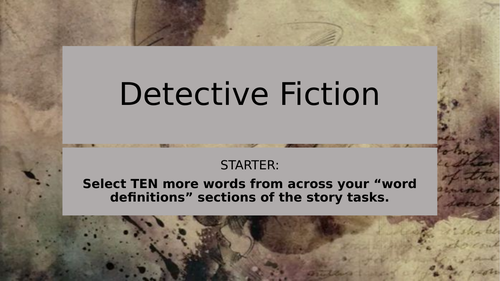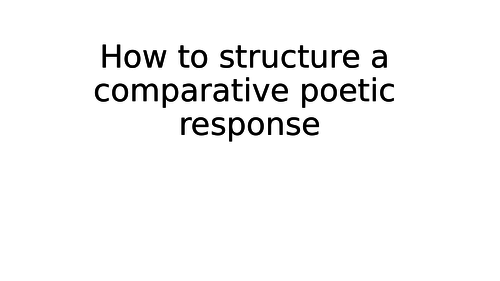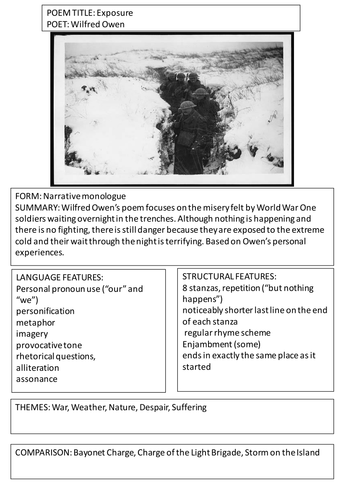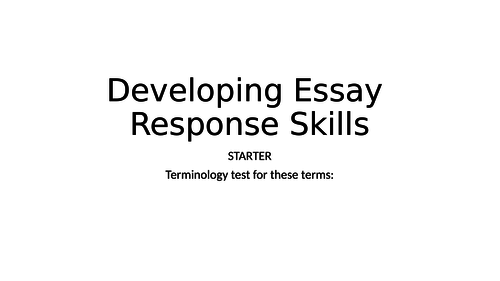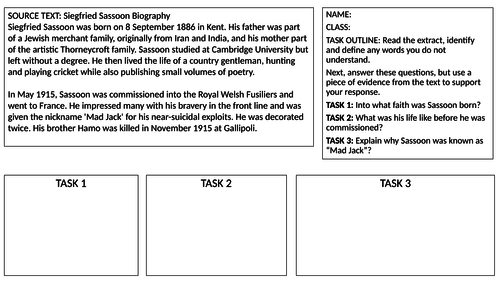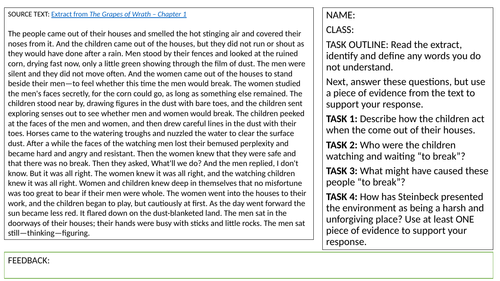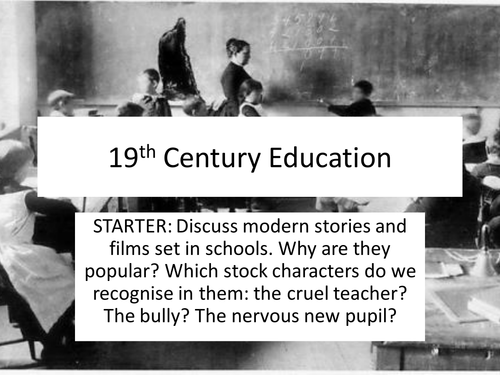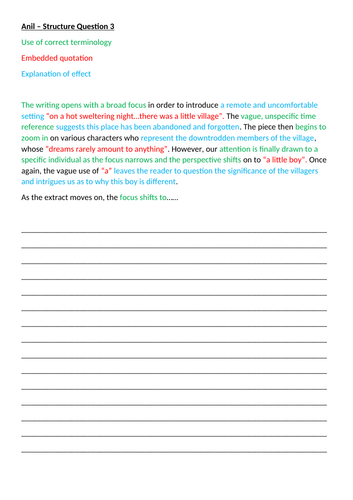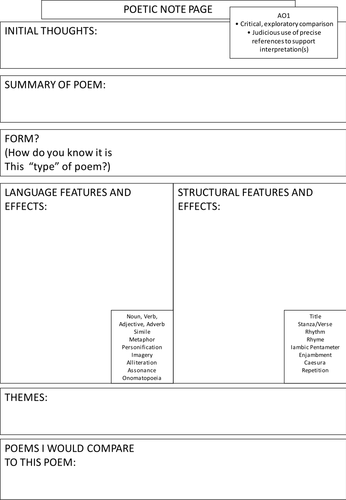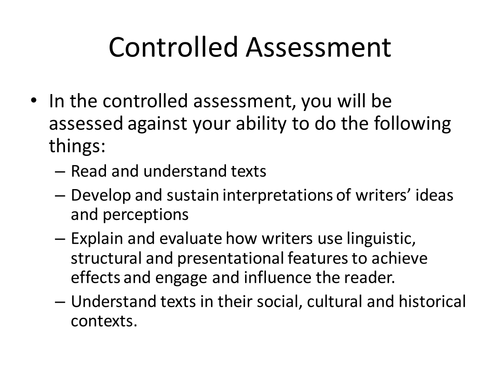
228Uploads
563k+Views
1397k+Downloads
All resources

AQA A-Level English Language and Literature: Othello (Revision)
A stand alone lesson that assumes all participants have read and understood the text. I used it as a platform to show students what they needed to be revising. There is some focus on themes and a focus on an extract - both areas of which I use as a stimulus for class lead discussion. I finish with an exam based question - the focus is upon the characters that are manipulated, not the manipulator (just to keep them on their toes). Hope you find this useful.

KS3: Detective Fiction - Sherlock Holmes. Workbook included. Reading and Writing SoW.
A thoroughly enjoyable unit of work. Built around a work booklet and designed for that awkward half-term at the end of the year where you don’t want to give out new exercise books.
The workbook contains a copy of The Norwood Builder, comprehension questions and vocabulary list, as well as a variety of activities that focus (primarily) upon creative writing skills with some language and structure based tasks.
The lessons are designed to be used with the workbook.
NOTE: I may upload a slightly different workbook in the future, but I will leave the original on here.

AQA A-Level English Language and Literature: Othello - Lesson 4 (The Violence Within)
A thematic exploration of Violence within Othello - focusing specifically on Act 4. Also, the power point starts with a little revision of characters and quotations from across the play. I found this a fun lesson.

AQA English Language and Literature: Developing Essay Writing Skills for the Heaney section
I used a similar approach with the Paris Anthology section and my class found it to be very useful. The issue they were having focused on incorporating enough AO1 terminology appropriately. This lesson is designed to talk them through an approach to an essay question, starting with the poetic voice, moving on to selecting relevant areas and then placing each level of language as a different starting point before exploring ideas across the language levels. It seemed to work…
Hope others find this useful as a starting point.

AQA Power and Conflict Poetry Revision Cards
A series of revision cards designed for students to use independently to aid with the revision process. I will add to these as I go.

AQA English Language and Literature: Developing essay response skills to the Paris Anthology section
This is my attempt to engage and develop my Year 12s academic voices in their Paris Anthology related essay responses. The main issue my class had seemed to focus upon when and where to start. What I do is show them how they can place a particular emphasis on one of several potential areas of focus initially. I show them how they could use Mode, Audience, Purpose, each of Grice’s Maxims and each of the different levels of language as a starting point for an analytical response. The attached word document appears to be an “essay”.It isn’t. It’s the collected starting points placed in one document so that the students can focus more on the “how you do it” instead of trying to copy down the best bits.
It worked reasonably well and is suited for a class with similar needs. Hope you find this useful.

KS3: As You Like It - GCSE Focused SoW
To make effective use of this scheme I suggest you have a copy of the most recent RSC version of As You Like It (It is quite marvelous…) else a lot of the images I use will make little sense.
There are five “lessons” that each last around the two hour mark. Each of the assessments is available, so the whole package is a self-contained unit of work. We had a lot of fun with this unit, and I inter-spaced the learning with periods where the class would act out elements of the play.
You don’t necessarily need a copy of the play to teach this unit either.

KS3: SPaG Understanding a Text Lessons (Focusing on WW1 poets and their background)
This uses a format I’ve used elsewhere. The lessons are designed to support the teaching of conflict poetry from WW1. The goal is that the students sharpen their reading skills and get a boost in their English lessons where the poet is the subject of focus.

KS3: SPaG Understanding a Text Lessons (Focusing on John Steinbeck)
Designed to be taught in support of a Year 9 class doing a GCSE-style task on Of Mice and Men. These powerpoints make good activities as part of a lesson, or they can be printed off as individual worksheets. The worksheet element contains a RAG rating system and some generic targets, suited for peer or self assessment.

KS3: Introduction to 19th Century Literature
A bank of lessons and extracts that introduce Key Stage 3 to a variety of different 19th Century Literature texts. Designed with a top set year 8 class in mind. Draws heavily from the AQA material - look at this as either a time-saver or a starting point.
ADDITION: These lessons are intentionally “light” in terms of their content - the main aim of this unit was to get the students to read the extracts and to ask questions about them. As a result, the lessons I’ve built contain gaps that allow me to react to the needs of the kids. If your intention is to purchase these lessons, please recognise that you will need to fill these gaps yourself. The lessons were only ever intended as a starting point.

Year 7 (KS3) Introduction to Poetry Unit of Work
A collection of resources I have used to introduce KS3 (specifically year 7) students to poetry with a view to them writing their own anthology, and exploring an unseen poem.

KS3: Exploring the theme of "Journeys" - A Sound of Thunder (Reading SoW)
I had a lot of fun with a bottom set, boy heavy year 9 group with this. They took to the story well and did OK with their reading assessment.
Enjoy and let me know how it goes.

Debate Boxing
This is quite possibly, the coolest thing I've ever tried out. The premise is as follows: a debate between two students (or teams) where four referees observe. The referees score what they see and a winner is announced at the end.
Now add in entrance music a la pro-wrestlers (think the Rocky Theme, We Will Rock You etc.) and run it on an open evening and I promise you this - you will have EVERY parent in at some point to see what is going on.
I've run this at SIX parents evenings now and the same thing happens every time - all of the kids rock up to watch. I set it last time round where the Deputy Head took on the winner of the students (a year 9 girl). They packed the place out to see who won . The debate topic "Batman vs Superman" (serious stuff this). Needless to say, she wiped the floor with him (in a totally professional way).
You'll need to be the promoter/commentator/ring side referee - this can be exhilarating and exhausting!
Try it.

AQA: Year 9 Intro to English Language Paper 1 + Workbook
A variation on a selection of lessons that I sell elsewhere. Here, the center piece is a 26 page printable workbook that runs in tandem with the power-point lessons - ideal for a Summer Term 2 unit of work where you are reluctant to give the students a new work book, and working on paper is problematic.
The text is Anil (from the old Sunlight on the Grass Anthology) and there is about 12 lessons worth of material here.

KS3: Introduction to Pre-1914 texts
A useful little unit that we put together to fill a 2/3 week gap. It has the students explore pre-1914 material - poetry and prose - and ends with a controlled assessment in the vein of the old AQA English style questions for the Literature paper.
Might fill some other gaps out there in shorter half terms.

KS3: Exploring the theme of "otherness" in Shakespeare
A unit of work I did not design, but these are the lessons I created to teach it. The lessons focus on The Tempest and Othello. These lessons were designed to be taught to a bottom set Year 9 class with more interest in staring out of the window than exploring the linguistic delights of the Bard. However, once I started to Story Woosh the plays, the analytical lessons became much more productive.

AQA Poetry Cluster 2 Revision Booklet - Power and Conflict Poetry
An 84 page long booklet that provides you with the following:
A thematic table
A section for each poem where you can find a copy of the poem, a notes page (complete with helpful guidance), generic revision and exam questions and a response page
A comparative table
A copy of the mark criteria
I have also included the documents I used to make this just in case you want to make a different version yourself.
Enjoy, and be poetic.
ALTERATION: I’ve updated the resource now - found one or two typos. Also, I’ve added in a grid that allows for a variety of themes to be “graded” in terms of how present a theme is: I’ve found this to be an engaging way of getting the students to compare. Finally, I’ve added a small section at the end about the different types of poetic forms.

D6 Dungeons and Dragons: Christmas Mission Pack - THE CASTLE OF TERROR!
PREMISE: You are going to enter the Castle of Terror to save Santa Clause. He has been kidnapped by the evil Necromancer, Alan. His devilish plan is to suck the Xmas spirit out of Santa, and use it to power his horde of undead. He has banded together with the Orcs and Goblins of the nearby Dark Forest. They will protect him whilst he finishes his experiments. You must hurry. The fate of Christmas rests with you…
A mission pack that builds on the free D6 Dungeons and Dragons lesson I created. Print this off (delete the first slide though) for students, or set it up as a power point for the Dungeon Master. All the kids I tried it with loved it. Some of the quotes:
"Voldemorts stolen my nose! Give me back my Magic Dagger!"
"You are the worst re-animated corpse EVER!"
"I use my Staff of Uncertainty to turn you into a Gibbon."
A seriously creative lesson.
Enjoy.
PS - I've also added the initial lesson (Lesson 1) as a starting point for the kids - gets a bit complicated otherwise.

KS3: Exploring Poetry (Character and Voice section of old AQA Anthology)
I used these lessons with year 9 classes. They still adhere to the old AQA specification (they talk of bands). But, each lesson is a complete poem and will save you some work.

AQA English Language Paper 2 Section A Revision Lesson
A single power point designed to be taught as a walking-talking mock examination. This can extend over several lessons - I predict you'll need at least three to do this justice. The source materials are included.


